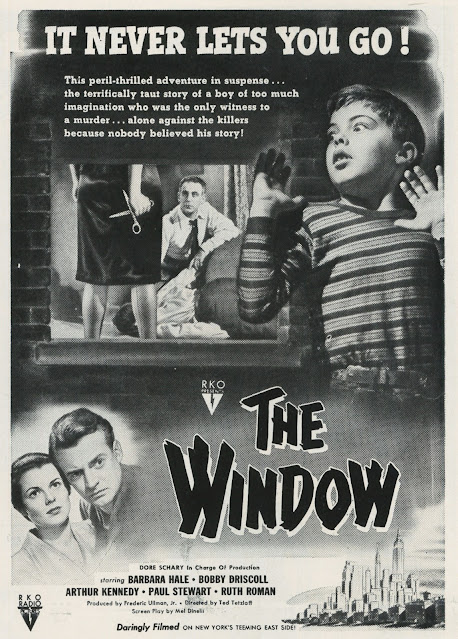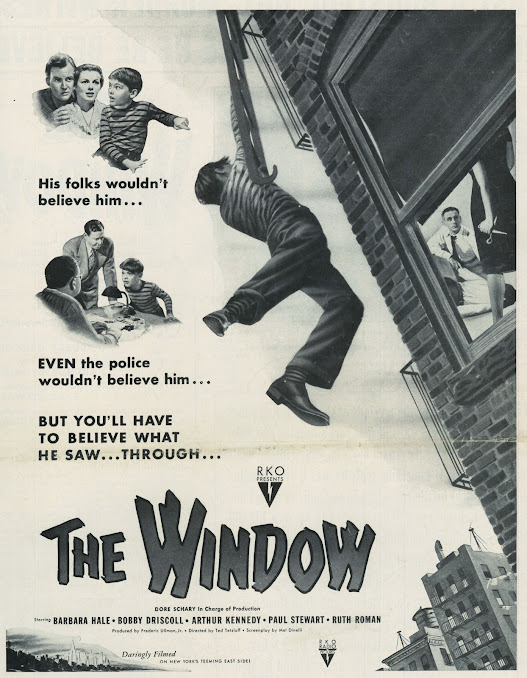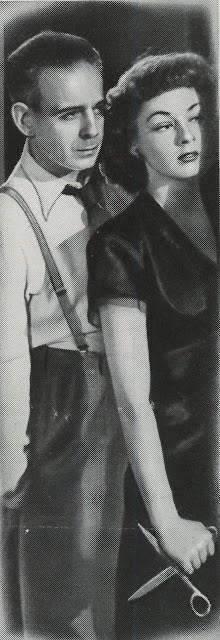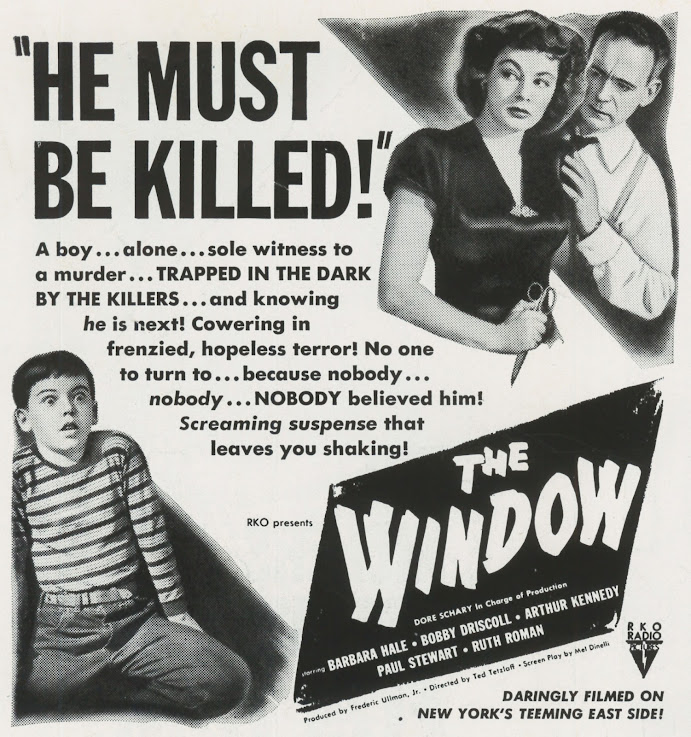What a Sleeper Was in 1949
The Window Goes Places New To Noir
From a simple pair of scissors do sleepers sometimes awake. RKO did a crackerjack job making a hit of what they spent a mere $696K to create. Fact the merchandise was so good was a help, The Window adapted from a Cornell Woolrich story. He had, would continue to, supply grist for noir and thriller wheels. Let go the fact that Woolrich himself had so rough a road to hoe. Read his life and wonder how he managed so many fine short stories and novellas. Was there a a curse upon ones that wrote for pulps? Money wasn’t so good, certainly not enough, nor of fame, but where would movies have been without the Cornell Woolrichs in back of them? The Window is murder through witnessing eyes of a boy who otherwise cries wolf and so is disbelieved. It defined for 1949 a word-of-mouth must see. More profit came of The Window than RKO realized for She Wore a Yellow Ribbon or The Big Steal of the same year.
“Sleeper” as byword for something discovered by a public instead of foisted upon them by publicity was a term promiscuously used, before and since 1949. Surrounding seasons had seen the label attached to Jungle Patrol, The Doctor and the Girl, The Return of October, and The Lawless, so easy to see it was wishful thinking, as who recalls those, except possibly The Lawless (1950), which slept indeed as patrons spent elsewhere. I’m betting Terry Turner ran promotion for The Window, as result bespoke his genius. Ads and pub used the scissors, a motif central to the film’s killing that propels action (Ruth Roman the user). A weapon as central image juiced merchandising for Twelve Angry Men and of course Psycho in years after, shorthand always for violence and suspense to be got for buying your ticket in.
Anomaly … well, maybe not as this was RKO after Howard Hughes took over … saw The Window getting a sneak preview at the RKO-Hillcrest Theatre in Los Angeles on June 1, 1948, nearly a year before the film was released. Hughes had a habit of holding product back until he had an opportunity to vet each offering personally. Based on his erratic schedule and indifference to distribution policy as set by underlings, this meant many a feature sat on shelves indefinitely. I sometimes wonder if there are RKO movies yet that we haven’t seen. The Window at its 6/1/48 unveil, a totally unknown quantity for which the title tipped off nothing, got huzzahs from its cold-call audience, “patrons were sitting on the edge of their seats all the way, and frequent gasps at the crucial moments and the rousing applause they gave at the finish proves what an emotional wallop this picture has,” said The Radio Flash as reported by staffer Perry Lieber on 6/4/48, The Window noted also for “a compactness which adds vastly to the film’s intense quality.” This sleeper wouldn’t wake for nearly a year, even as favorable buzz spread from that first sneak at Hillcrest. Why wait to release what everyone knew early on was powerful product? Only Hughes knew, and he wasn’t talking.
Novelty inherent was letting a small boy be central to the threat, as in nobody buys his story … except the killers, a conceit not softened as these two (Roman and Paul Stewart) are intent on getting rid of little Bobby Driscoll by quickest means however foul. Bobby had been a moppet for Disney, lately in Song of the South, So Dear To My Heart, being sung to by Roy Rogers in Fun and Fancy Free. To put him amidst gritty environ of New York tenements, his life in the balance (literally … there are rooftop, high-set perils), this a scary depart from rules 40’s viewership were used to. The Window sold what really was novelty for its time. Parents play clueless support, unresponsive to the boy’s warning, as are police, the child utterly alone in trying to save his own life and bring murderers to account.
The Window is genuinely suspenseful in a modern sense for the bold set-up, surprising, or maybe not so much, for attitude of those who would nurture at a time when upbringing was a job conducted very different from what we now expect or would support. Where father says “punish,” he often as not means a whipping, or, as a friendly police officer jokes, a “shellacking like my old man used to give me.” Kids getting tough love from Dad, with Mom approval, was accepted practice in an era where corporal discipline held sway. Yes, it was common to send a child to his/her room without supper. Here it is Bobby banished to bed sans lunch or the evening meal. I worried as much for what pop Arthur Kennedy might do as whatever Ruth Roman/Paul Stewart had in mind. Latter pair have abducted the boy at one point and hustle him roughly into a cab, the driver thinking nothing of it … just parenting as usual as he sees it. Cop on the beat that Driscoll yells to is moved not at all by his plea for rescue, warning instead of the tanning he’ll get later for disobeying what appears to be his parents, but of course are not. As Lillian Gish said later in Night of the Hunter, it surely was a hard world for little things.
I wonder if seeing The Window obliged parents to go gentler with offspring. Were children traumatized by having seen it? Something tells me fewer than what might be imagined, as youth were undoubtedly tougher then. Something about Driscoll’s character tells us he will think his way out of the trap, as surprisingly, pleasingly, he kills off lethal pursuer that is Paul Stewart, and will all but get a key to the city for his job well done. Suppose Disney regretted the loan of Bobby Driscoll to RKO for such intense workout? And yet The Window may have OK’ed Bobby shooting a pirate full in the face for a following year’s go at Treasure Island via Disney/RKO, a scene so graphic it had to be trimmed from a 1975 reissue to enable a G rating. I don’t know when a child’s fear was so utilized to sell a film than with The Window. Ads really exploit Driscoll’s terror and the menace Ruth Roman and Paul Stewart represent. This could almost be a horror movie were merchandising to be believed. I picture children, ones timid enough, keeping away or being forbade to go, and yet audiences, if we accept modern speculation re the era, were ready to embrace stronger mix by 1949, as The Window scored well in a year when most RKO releases lost money, a year in fact where most of industry outlay lost money.
The Window borrowed a semi-doc leaf from Fox’s book, at least to extent of shoot in Gotham which put RKO crew on site during November-December 1947. Though story was set in sweltering summer, Ann noticed as we watched that Bobby Driscoll, and some of other kids, wore long sleeves, which now I understand in view of chilly days they worked. Realism push for American films was meant in part to bring us in line with street scenes as captured by Italians and others of the continent. Director Tetzlaff, formerly of behind camera work going back to silents, was for telling The Window on visual terms, while others of the crew were lately off RKO Pathe’s newsreel division, that unit having been sold to Warners. This all enabled stark look of backgrounds to much enhance conviction, the postwar cycle getting closer to life, if on melodrama terms, than studio-bound output had. You could better believe far-fetched tales, pulpy ones even, where told on streets we might recognize from daily commute.
The Window as location made and detail of those behind it are described in welcome detail by Richard Koszarski in his recent Keep ‘Em In The East: Kazan, Kubrick, and the Postwar New York Film Renaissance (Columbia University Press), a latest in the author’s splendid series of books revolved around filmmaking in the Northeast (Paramount Astoria, Fort Lee companies etc.). Nobody beats Koszarski when it comes to this kind of research and result. His work sure enlivened the Window watch for me. Older transfers of The Window were serviceable, improved at least from C&C 16mm prepared for syndication in 1956 when the RKO library went first to television. Warners has lately issued a Blu-Ray to bring out more of values The Window had, but were hidden, since first-runs. It is a revelation to up-tick regard for the film and make fresh viewing a must.
NOTE AT RIGHT: Bobby Driscoll appears in person to greet attendees at Cleveland's RKO Palace.


















12 Comments:
A great film. Just watched it recently with the old ball and chain and a friend even older than me. What a blast. Bobby is the Man--so to speak.
John, your observations on the chilly temperatures during filming versus the supposed summer heat remind me of an episode of Alfred Hitchcock Presents that I watched a few days ago. With a story and teleplay by Ray Bradbury, "Shopping for Death" supposedly takes place on a 92-degree day, and everyone appears to be sweating profusely. However, at least part of it was obviously filmed on a chilly day because in one shot you can clearly see two characters' breath as they converse.
This, by the way, contrasts with the usual situation in films where characters are supposed to be outside on a frigid day but their breath isn't visible.
I've always avoided this due to my aversion to children-in-peril movies. But you've talked me into it.
I first saw this on late-night television at a very impressionable age (CBS, channel 2 in New York) sometime in the late 1960s.
Never forgot it. Wow.
Love this movie. Have seen it 8 - 10 times. The WB blu-ray IS incredible. Two viewings of it so far. Has that NAKED CITY feel. Emotionally draining. And Ruth Roman is hot, and I'm not talking about the weather.
And Uncle Walt didn't believe Driscoll was a good actor. Wow!
Will always have a warm feeling for this great movie. Back in the 70's-80's, friends would come over for occasional movie parties in our living room. I'd thread up the 16mm projector, show some cartoons (those I collected), then a feature. I usually had only one or two features at any one time, borrowed a lot from the public library. On one memorable evening about 18 friends joined my wife and I to watch a sturdy old C&C print of THE WINDOW I had just picked up from some guy across town for $25. Not one of my guests had ever heard of the thing, and there was a little grumbling as everyone got their drinks and settled down. The reaction, of course, was terrific and by time Paul Stewart was crawling after Bobby Driscoll on those rotted beams, most were either on the edge of their seats or standing up. A great evening. Will have to catch up with the Blu-Ray
Mike -- Walt was a genius but also a jerk.
Dear John:
A short note to rightly compliment you on your recent series of excellent posts. That Christmas OHMSS feature was among the greatest of all Greenbriar entries (and perhaps the best one ever about a post 1965 film).
I knew that THE WINDOW had been a big sleeper success for RKO -- despite Mr. Hughes apparently deciding to just sit on it for a year or longer -- but I never realized how shrewdly and smartly the studio had promoted the movie. These ads are right on target, boldly and directly addressing the film's plot and considerable suspense; they are also fairly classy, making it clear that the picture is no crass exploitation item. A terrific sales job. Thanks for bringing these to light!
As Mike Cline points out, Walt never did seem to feel that Bobby Driscoll, who gave effective performances in SONG OF THE SOUTH, SO DEAR TO MY HEART and TREASURE ISLAND (and voiced the title character and provided live-action reference for PETER PAN), was much good as an actor.
Richard Fleischer once said that Disney complimented him on his 1952 comedy THE HAPPY TIME by telling him, "Anybody who can make an actor out of Bobby Driscoll has got to be a great director!" This was a bit harsh -- and unfair. Driscoll is good in HAPPY TIME... but he's practically brilliant in THE WINDOW, much of the drama of which rests squarely on the young actor's shoulders. Your comment about how the memorably harrowing aspects of Driscoll's work in WINDOW might have inspired the Breen office to approve that still fairly shocking TREASURE ISLAND scene is quite interesting.
Regards,
Griff
Glenn over at CineSavant has a great review of the BR release and I contributed a perhaps too-revealing comment about Driscoll and the TI* scene. (*Long John Silver was apparently the template for the "Har, Matey" stereotype that has clung to pirates ever since.)
Just saw The Window again last night. First rate, of course, as a suspense thriller with those wonderful on location sites. Couldn't help but think of the irony that the film's climax is in an abandoned building, foreshadowing Bobby Driscoll's own end two decades later.
The film really belongs to young Bobby, who gives an outstanding performance but slimy Paul Stewart and sexy Ruth Roman are also to be commended for their work. Speaking of Ruth, considering her strong contribution to the film, it's a shame she couldn't have had a final departure scene. The last we see of her character she enters the abandoned building where all attention is then turned to Bobby pursued by Stewart. Roman just disappears without any kind of final image of her getting rescued or arrested.
And poor Richard Benedict just gets to play the victim in these early films for him, with a pair of scissors in the back in The Window, only to get another kind of back stab a couple of years later from Kirk Douglas in Ace in the Hole.
One more comment, John, if you don't mind, and that is in regard to Ruth Roman's performance in The Window.
I noticed that you said The Window had a positive audience sneak preview in June, 1948, yet Hughes, for whatever the reason,held the film up from a general release for another 11 months,according to IMDb.
How frustrating that must have been for Roman, after years of getting largely uncredited small roles, finally participating in a potential hit that would benefit her career,only to have the head of RKO hold up that film's release. And with Hughes being the kind of flake that he was, I suspect no one knew when or even if the film would come out.
Of course, Roman wasn't just sitting still during this same period, also appearing in Champion, which would get released a month before The Window, giving her career two boosts in two consecutive months.She'd soon be getting a few other roles, including one in which she would shine (Three Secrets).
Still, you have to wonder if the offers to the actress with potentially good roles wouldn't have started coming sooner for the lady if Hughes hadn't delayed the release date of The Window.
Okay, full confession, I've always had a bit of a "thing" for Ruth Roman,thus my sympathy for her situation with Hughes and the delayed release of The Window.
As soon as I see the name Cornell Woolrich I know it's going to be a cracking story. Haven't seen this one but I shall search it out forthwith. Great article!
Post a Comment
<< Home